Occasionally, a vehicle is tied to a time, an event, or even an era by history. While not as influential as the Beetle, the Volkswagen Van and its camper variant was as integral a part of the sixties as tie dye and Hendrix. Many Americans, from hippies to small families used these boxy haulers to venture near and far to satisfy their wanderlust. Blessed with the same rugged simplicity that made the Beetle such a hit, the only drawbacks to them were the lack of speed and the abundance of rust. This 1969 Volkswagen camper van found on Craigslist seems to be suffering from both. Going nowhere fast in Greeneville, Tennessee, this crusty camper can be yours for $3,000. No discounts for what falls off on the trailer ride home.
One of the constants of a Barn Finds writer is the discussion of rust. As if it is a law of the universe or something, the more interesting a car is, the more it rusts. Just look at Mustangs, Camaros, Corvettes (the birdcage and frame), and the 356 Porsche. All of these cars seem hell bent to return to the Earth. Meanwhile, crappy cars that nobody wants live forever. How can God be so cruel?
This VW van is a perfect example of an interesting vehicle that has almost passed the point of no return rust wise. Called the Kombi, Microbus, Transporter, bus, or camper, depending on who you asked, these vans were a staple of the Hippie Movement. They provided slow but reliable transportation for the hippie and his or her friends, and they were fairly good on gas. While most of the hippies used the regular van version, the camper van was the most desirable model. When new, the purchaser could pretty much customize them to meet their camping needs with such options as a sink, water storage and a pump, a plug in electrical system, and a few different configurations for the folding seats and beds. To my knowledge, a commodity that is limited at best, all of these were converted by a company called Westfalia.
Sadly, this one has been attacked by the tin worm in a spectacularly destructive manner. This camper, if you decided to take on the challenge, would have to be stripped down to its shell. Then, after mercilessly cutting out all of the rust, you would have to weld patches into what was left. You would probably be well past the point of no financial return, but if reliving your hippie days, or being a born again hippie appeals to you, then this would all be worth it.
Of course, the work and spending wouldn’t stop with the shell refurbishment. Everything in the interior has seen a lot better days, and it would take a Kaiser’s ransom to get it back to factory condition. While reupholstering the seats and door panels may be survivable financially, purchasing door rubbers and window trim for German cars of this era is an exercise in spending not seen since the movie Brewster’s Millions. Finally, restoring the pop up top and canvas would also probably be the monetary equivalent of kinking someone in the ribs when they were down for the count.
In the back, you might be able to restore some of the cabinetry, but why would you want to? Once you scrape up the definitely not factory correct linoleum and address any hidden horrors underneath, why not take it to a cabinetry shop with a copy of the original furniture blueprints to have them reproduced in a better quality of wood? The only reason to restore the factory wood, if you could, would be for a 100 point restoration at an AACA show. If you are going to use the van for its intended purpose, that should be reward enough. If I were camping in it, I would want things to be as nice as possible.
Behind the rear cover lies the ubiquitous Volkswagen flat four cylinder engine. While these are cheap to own and fairly easy to rebuild, they certainly aren’t the power choice of top fuel drag racers. They were pretty inadequate for the job, especially considering the aerodynamics of the vehicle made the engine’s job tougher and tougher as the speedometer needle very slowly climbed. Runs downhill, from what I have heard, were another thrill altogether.
I guess you would have to ask yourself if this particular camper van would be worth all of the effort and cash needed to get it back on the road and into the campgrounds. For me, even though I think the general concept of a small camping van that could be used as everyday transportation is a good one, I feel this one is too far gone. Everywhere you look you see another hole to throw money down. If you could afford it, your children’s college fund would be better spent buying a more pristine example. Volkswagen produced these for a number of years, and they were more powerful and better equipped each year.
Still, it is not hard to see why these vans have such a broad appeal. I wish someone in the automobile industry could find a way to make an up to date version of one of these that didn’t run north of $40,000. Can you imagine how well a modern version at $20,000 would sell?
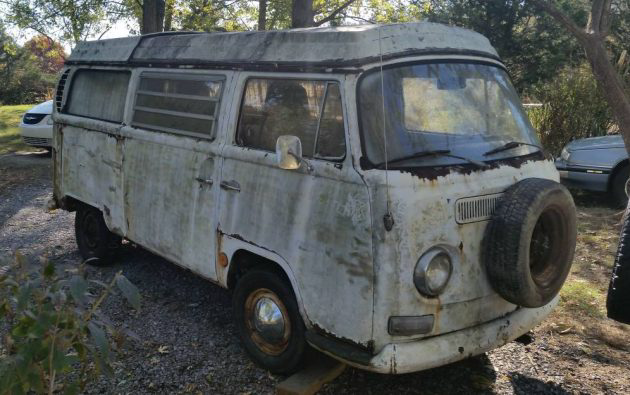
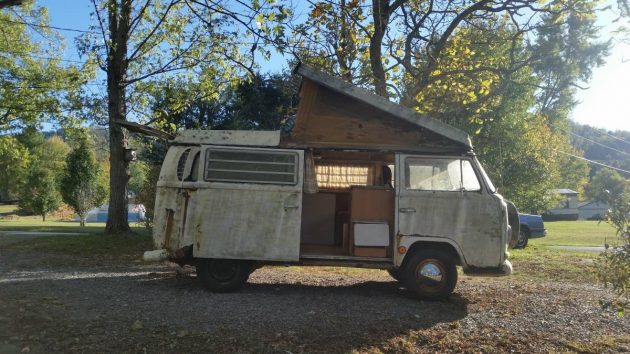
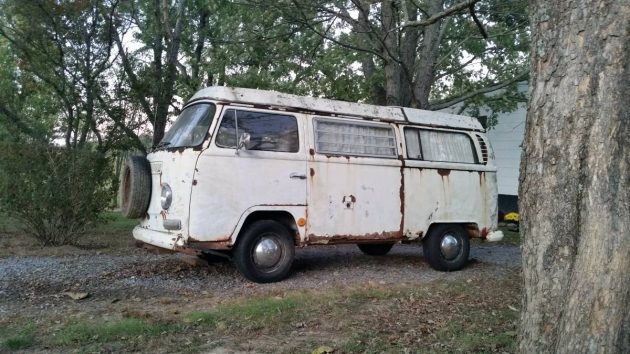
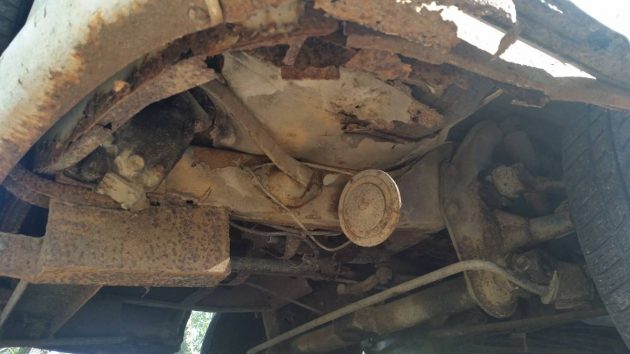
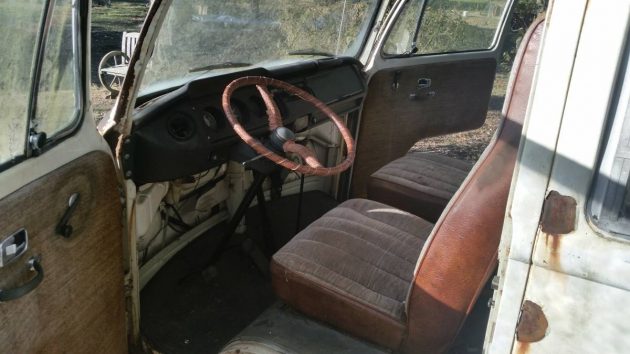
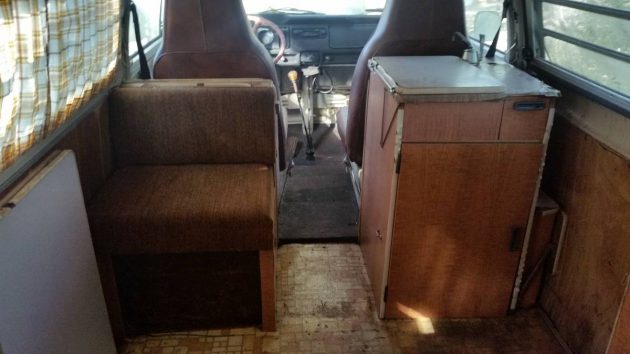
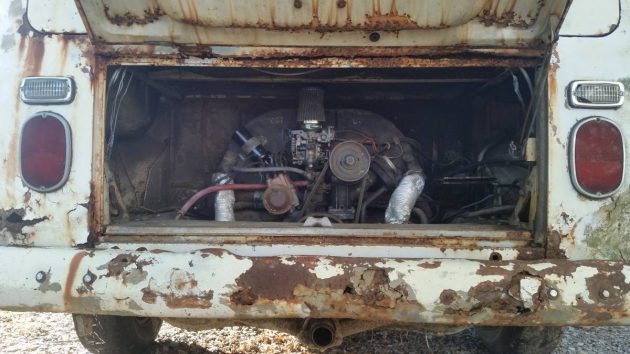


Rusty tie-dye.
Westfalea campers were the only version directly available from VW. There were a number of other companies that made conversions as well.
Rust??? Not worth the effort or money…sorry
Looks too far gone. Seems like somebody loved it once and reupholstered the interior…..always wonder how cars pass from a caring owner then end up like this.
Why don’t people at least wash these things first? We’ll believe you when you said you found it in a barn, even if it’s clean.
This is what American pickers has done to the Volkswagen market, Everybody with the Volkswagen bus thinks it’s worth 10 grand.
I don’t think American Pickers did it single handily.
I think this VW is definitely restorable . Repair panels are available and these bay window buses and very pricey restored .
A 40 hp, gutless wonder. Good for flatlands close to the beach though. Hills should not be attempted in these!
My Dad had a customer who had one of these with the motor in bushel baskets in the inside , bought it for a song ,sent to JC Whitney for rebuild parts , put it all back together , used it for several years until rear ended by a drunk , traded it off for a Ford Ecoline van made a camper out of that , wow what power that Ford had comparied to the VW !!
Actually these VW vans were on the rise long before the pickers started buying them and Volkswagen has given serious consideration into building an updated version of these. However one needs to add in the cost of emissions, and body safety rigid anti crush zones plus active safety restraints, and air bags etc. etc.
They even went as far into the project as to build a concept vehicle. It was really cool looking, but then nothing seems to have come of it. Sad.
Not all air cooled Volkswagens have 40 horse engines!
Philip if you are really into barnfinds, believe me, its very hard to wash the dirt off! I’m guessing you’ll get quite a laugh out of that, because obviously you’re not! In these days of ridiculous over-restoration, (a true purist restoration is making the car look EXACTLY as it did when it left the factory, which is much more difficult than these Gucci restorations), these barnfinds are much more appealing, and the ultimate is dirt intact! Barnfinds have been known to sell for MORE than concours restorations.